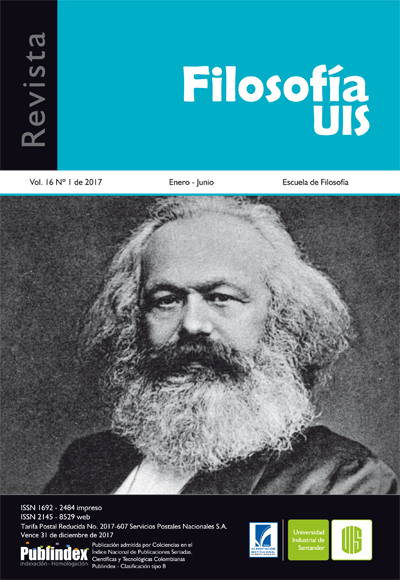Published 2017-09-11
Keywords
- concepts,
- Dreyfus-McDowell debate,,
- expertise,
- practical concepts,
- theory of content
How to Cite
Copyright (c) 2017 Revista Filosofía UIS

This work is licensed under a Creative Commons Attribution 4.0 International License.
Abstract
In this text it will be analyzed if the notion of ‘concept’ is enough to explain the content of the experience and the guide of the activity of an expert when she/he is performing her/his skillful activity. The text will start analyzing two explicative models of expertise, the conceptualistic model of McDowell and the Phenomenological model of Dreyfus, trying to focus in how both models explain that expertise requires a presentation of the world and a guide to the activity that is sensible to the particularities of each concrete situation where expert action is performed. In this point, McDowell’s model proposes ‘practical concepts’ as its central notion. At the end, it will be introduced a proposal about how to understand the practical concepts and it will be offered an argument to show that such concepts are not enough to explain the content of the experience and the guide of the activity that an expert has.
Downloads
References
Anscombe, G. (1979). Under a Description. Nous, 13 (2), 219-233.
Cussins, A. (1992). Content, Embodiment and Objectivity: The Theory of Cognitive Trails. Mind, New Series, 101. (404), 651-688.
Cussins, A. (2002). “Experience, Thought and Activity” En Essays on Nonconceptual Content. Cambridge: MIT Press.
Danto, A. (1979). Basic Actions and Basic Concepts. The Review of Metaphysics, 32 (3), 471-485.
Dreyfus, H. (2005). Overcoming the Myth of the Mental: How Philosophers Can Profit from the Phenomenology of Everyday Expertise. Proceedings and Addresses of the American Philosophical Association, 79, 47-65.
Dreyfus, H. (2007). The Return of the Myth of the Mental. Inquiry 50 (4), 352-465.
Dummett, M. (1981). “Sense and Reference”. En Frege Philosophy of Language. Cambridge: Harvard University Press.
Evans, G. (1982). Varieties of Reference. New York: Oxford University Press.
Gibson, J. (1979). The Ecological Approach to Visual Perception. Boston: Houghton Mifflin Harcourt.
Frege, G. (1948). Sense and Reference. The Philosophical Review,. 57 (3), 209-230.
Haugeland, J. (1998). “Truth and Rule-Following” En Having Thought: Essays in the Metaphysics of Mind. Cambridge. Massachussets: Harvard University Press.
Heidegger, M. (2001). Being and Time. Oxford: Blackwell Publishers Ltd.
Kripke, S. (1980). Naming and Necessity. Cambridge: Harvard University Press.
Lavin, D. (2012). Must There Be Basic Action? Nous, 47, (2), 273–301.
McDowell, J. (1996). Mind and World. Cambridge: Harvard University Press.
McDowell, J. (2007a). What Myth? Enquiry 50 (4), 338-351.
McDowell, J. (2007b). Response to Dreyfus. Inquiry, 50(4), 366-70.
McDowell, J. (2009). “Avoiding the Myth of the Given” En Having the World in View–Essays on Kant, Hegel, and Sellars. Massachusetts: Harvard University Press.
Ordóñez, C. (2017). McDowell: pasividad, contenido y percepción. Praxis Filosófica Nueva serie, No. 44, enero-junio 2017: 13 - 36.
Russell, B. (1917). “Knowledge by Acquaintance and Knowledge by Description” En Mysticism and Logic. London: George Allen & Unwin.
Ryle, G. (2000). The Concept of Mind. Chicago: University of Chicago Press.
Sellars, W. (1956). “Empiricism and the Philosophy of Mind”. Minnesota Studies in the Philosophy of Science, (1), 253-329.
Stanley, J.; Williamson, T. Knowing How. The Journal of Philosophy, Vol. 98, No. 8 (Aug., 2001), pp. 411-444.
Strawson, P. (1980). Individuals. London: Routledge.
